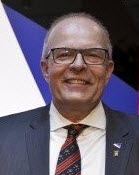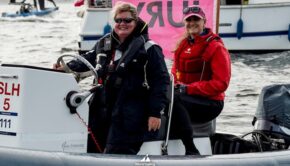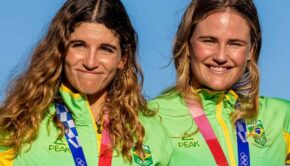Sailing for Tokyo 2020 and Beyond
Published on April 23rd, 2017
Denmark’s Kim Andersen was an unexpected challenger to Carlo Croce for the Presidency of World Sailing. His announcement in September that he was standing was greeted with more than a few raised eyebrows.
But November 2016, Andersen made history when he became the first candidate to unseat an incumbent in the organisation’s 110-year history. With Liam Morgan of insidethegames.biz, Andersen shares some insight into Sailing for Tokyo 2020 and beyond.
“We are maintaining the (ten) Olympic events as they are, with the classes, but we are fulfilling the IOC’s wish of having gender equity,” Andersen said regarding the Tokyo 2020 Olympic sailing programme. “There will not be gender equity in the medals or disciplines but we are having it in the participation.
“The logic behind that is that in our sport, like any other sport, there is a big difference between men’s and women’s participation now. We have used the equality leverage to get more women into some of the classes so we can train and coach them.
“We think we can create a faster development for women to get into our sport this way than by giving them more medals.”
While the programme itself will virtually be an exact replica to that at last year’s Olympics in Rio de Janeiro, Andersen did confirm they had submitted a proposal to the IOC to include a demonstration event alongside the official races.
Andersen, the current vice-president of leading construction and civil engineering company MT Højgaard Group, also refused to rule out changes in the future. Among the current possibilities is the introduction of a long distance event – sailing’s equivalent of the marathon.
“You have to look at the equipment, the qualification – you have to look at all of these things, which we haven’t done yet,” said Andersen.
“There are many questions when it comes to new events. What type of equipment should you use for long distance? Should it be a mixed event? This is a good idea.
“You also need to think about what size of boat are you using and what is the availability of these boats worldwide. So there are plenty of details to be looked at.”
Another element of the existing programme which World Sailing are currently reviewing is the medal race format, a popular bone of contention among the sport’s athletes over the years.
Some feel sailors being awarded double points for the last event is unfair, while the governing body are wary there are too many Olympic titles being decided before the event itself draws to a close, which detracts from the overall spectacle.
Ways in which to negate this issue have already been trialed. World Sailing tested a new three-heat, single points medal race at the 2017 edition of the annual Trofeo Princesa Sofia, held in Palma de Mallorca in Spain last month. Expect more work to be done in this area in the coming months and years.
“There is a lot of history around that and people are looking into that, maybe looking at the scoring system or the format that we are doing and that is still up to the Events Committee. They will have some discussions around that,” Andersen, who was part of the management team with the Danish Olympic squad from 1992 to 2002, said.
“In one of the Olympic classes, the Finn class, they have tested a new event where you had a round-robin race and then you had a semi-final.
“First and second place went straight into the final and then there was a race sailed as a semi-final to fill the last three places in a five-boat final. There are some things getting tested now.
“Having said that, at the Olympics, in some of the classes you had people going out in the gold medal position and coming in at number four. So I think you can say the medal race has its faults but it’s not all that bad.
“If an athlete is really so good that he is winning all the races it is probably fair that he is winning the gold medal before the last race.
“The thing we have gained with the medal races is that everyone knows that if they are there on that day, they will see a medal race and they will see that medal presented.”
It is not long before our conversation veers back towards Tokyo 2020. This time it is the Paralympics which are the focal point as Andersen, who served as a member of the World Sailing Council between 2000 and 2008, reflects on the blow dealt to the sport by the International Paralympic Committee (IPC) back in January 2015.
Sailing was rocked by the announcement that Para sailing had been cut from the programme, largely due to a failure to fulfil minimum criteria for worldwide reach. Disappointment and devastation were prominent parts of the lexicon divulged by the governing body in the immediate aftermath as they struggled to come to terms with the ramifications of the decision.
Their response was one of defiance. First, they went about pursuing reinstatement at the earliest possible opportunity. When the door was shut on 2020, they turned their attention to regaining their Paralympic place in 2024 with the launch of a Para World Sailing strategic plan.
Subsequent meetings with the IPC have been described as positive and productive. Andersen, who a keen advocate of the Paralympic discipline of the sport, is confident their bid for re-inclusion at the 2024 Games will be successful. He knows, however, that the work is only just beginning.
“We are doing what we failed to do last time and what we are going to do moving forward is very much in synchronisation with what is needed and what the Paralympics want to see,” he said.
“We are already expecting the keel class to have enough nations to fill in the qualifications which is necessary as a minimum requirement for the Paralympics.
“Many of the boxes we need to tick off we can already tick off this year and then we have a plan to grow further. Just reaching the minimum criteria is not enough for sailing – we would like to really expand Para sailing.
“More importantly, up until recently Para sailing was a separate issue but now Para sailing is part of World Sailing. We have totally merged. It was a huge wake-up call that you should never take anything for granted and once you start doing that you are probably not as sharp as you could be.
“We have had this experience and we cannot change it, all we can do is learn from it and be better in progressing our sport as a Paralympic sport, which we are doing now. So I am very sure once we get in it will not happen again.”










 We’ll keep your information safe.
We’ll keep your information safe.